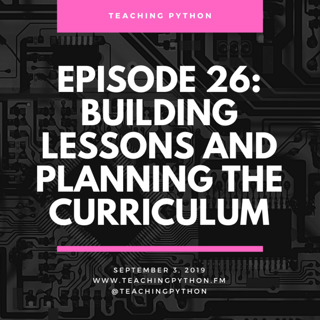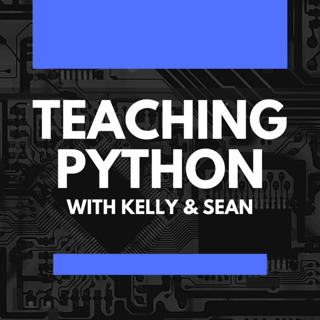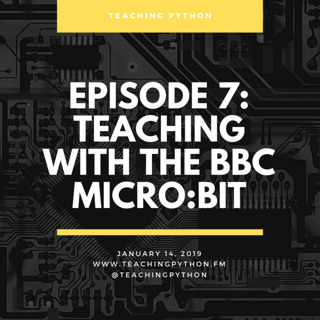
Episode 31: The School of 2024
Can you belive it's only been five years since Alexa launched? Or that identifying birds in photos was considered a hard problem (https://xkcd.com/1425/) for machine learning? In this episode, Kelly and Sean discuss plausible trends in machine learning, artificial intelligence, augmented and virtual reality, and data science that we may see in schools by 2024. We focus on 5 areas from microscale in the classroom to macro across the entire educational system. Trends in the Computer Science classroom Integration into other subjects Reducing Teacher Workload For Student Access to Tools As a School-wide Initiative It's amazing to think that many problems in Machine Learning were considered hard just 5 years ago. What will the next 5 years bring?
11 Nov 201946min

Episode 30: Teaching Adult Learners
In this episode, Kelly and Sean speak to Reuven Lerner about how to teach adult learners and people switching to Python from other languages. Reuven is a corporate trainer of Python and Data Science. He helps developers around the world learn how to code in Python. As fellow teachers, we dive into the similarities and differences of teaching adults versus students. What works? What is new and interesting? Our guest, Reuven Lerner, is a full-time Python trainer. In a given year, he teaches courses at companies in the United States, Europe, Israel, and China — as well as to people around the world, via his online courses. Reuven created one of the first 100 Web sites in the world (https://tech.mit.edu) just after graduating from MIT’s computer science department. He opened Lerner Consulting in 1995, and has been offering training services since 1996. Reuven’s monthly column has appeared in Linux Journal (https://linuxjournal.com/) since 1996, and was a panelist on the Freelancers Show podcast from 2015 - 2019. He is also the CTO of Rent Like a Champion (https://rentlikeachampion.com/), an event-based home-rental company based in Chicago, Illinois. Reuven’s most recent book is “Python Workout (https://www.manning.com/books/python-workout),” a collection of Python exercises with extensive explanations, published by Manning. Reuven’s free, weekly “Better Developers (https://lerner.co.il/newsletter)” newsletter, about Python and software engineering, is read by more than 10,000 developers around the globe. His “Trainer weekly (https://lerner.co.il/trainer-weekly/)” newsletter is similarly popular among people who give corporate training. Reuven has a bachelor’s degree in computer science and engineering from MIT, and a PhD in learning sciences from Northwestern University. He lives in Modi’in, Israel with his wife and three children.
5 Nov 201955min

Episode 29: Non-Traditional Python Education
This week, Kelly and Sean are joined by Brianne Caplan (https://www.briannecaplan.com) from Code Your Dreams (https://www.codeyourdreams.org) and Gabrielle Rabinowitz (https://twitter.com/gabriellerab) from the BridgeUP: STEM Program (https://www.amnh.org/learn-teach/bridgeup-stem) at the American Museum of Natural History to discuss K-12 Python Education that happens outside of the classroom. Special Guests: Brianne Caplan and Gabrielle Rabinowitz.
28 Okt 201948min

Episode 28: 10 Things We Wish We Knew
Has it already been a year of learning and teaching Python for Kelly and Sean? In this episode, our co-hosts talk about the things they wish they knew a year ago to make their Python journey even better. 10 Things We Wish We Knew Before We Started Python Don't Be Afraid of the Unknown There's Never Going to be Enough Time Reading Error Codes Simple and Slow beats Complex and "Correct" Read a little. Code a lot. Projects Really Work You Have to Teach To Someone Reach out to the Python Community Don’t Let Imposter Syndrome Get You You Don’t Have to Answer Every Question
20 Okt 201933min

Episode 27: Automate the Boring Teaching Stuff
Isn't it surprising how much repetition goes into the job of teaching? What if you could use Python to automate that and focus on the work that adds the most value for your students? Or at least eliminate the boring teaching stuff like transferring grades or setting up iPads. With thanks to Al Sweigart and his book, Automate the Boring Stuff With Python (https://automatetheboringstuff.com/), Kelly and Sean look at how teachers can leverage Python to speed up or eliminate the most boring and repetitive aspects of teaching. This episode includes a walkthrough of an example project that Sean built to automate iPad setup at his school using Google Cloud Functions (https://cloud.google.com/functions/), JAMF Server APIs (https://www.jamf.com), and Apple Device Management (https://developer.apple.com/documentation/devicemanagement).
4 Okt 201943min

Episode 26: Building Lessons and Planning the Curriculum
In this episode, Kelly and Sean discuss how their philosophy of teaching helps them to design their daily curriculum for the course.
3 Sep 201948min

Episode 25: The Best Editors and IDEs for Teaching Python
What are the best editors for teaching in Python? In this episode, Kelly and Sean examine a variety of different environments for students to learn to code Python. Should it be online or local? Paid or free? Simple or full-featured? An editor or an IDE? Here's what made our list: Mu Editor (https://codewith.mu) Visual Studio Code (https://code.visualstudio.com) PyCharm Edu (https://www.jetbrains.com/pycharm-edu/) python.microbit.org (https://python.microbit.org) Repl.it (https://repl.it) Jupyter (https://jupyter.org)
17 Juli 201934min

Episode 24: Avoiding the Summer Slide (For Teachers)
Many teachers give advice to parents on how to keep kids engaged during the summer. Sean and Kelly take their own advice and apply it to teachers and professional development. In this episode, we discuss how to avoid the “Summer Slide” and what we are doing to keep on learning.
27 Juni 201930min






















